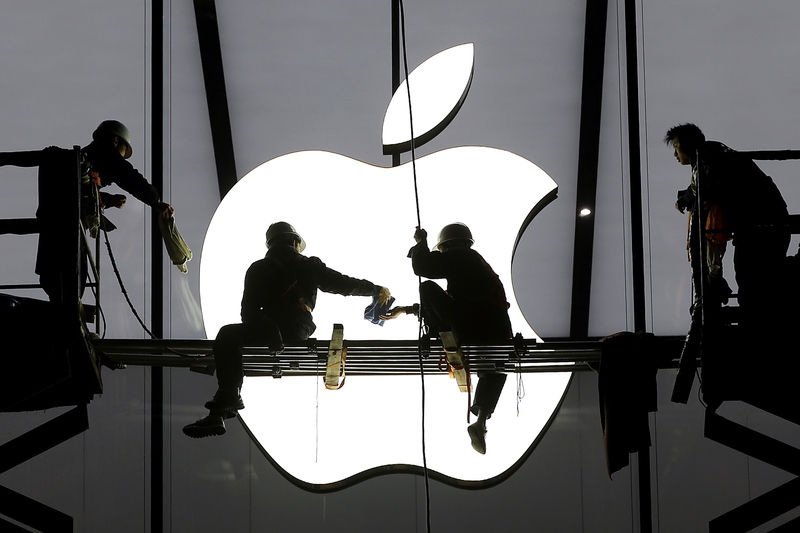By Nichola Groom
(Reuters) - Apple Inc's deal to buy nearly $1 billion of power from a massive First Solar Inc plant could be the first of a stampede of contracts driven by the looming change in a solar tax incentive that makes such projects particularly attractive.
Together with a sharp drop in the cost of solar power and corporate efforts to rack up green credentials, the expiring tax subsidies have large energy purchasers taking a hard look at buying solar under big long-term contracts.
Apple on Tuesday said it would spend $848 million over 25 years to buy 130 megawatts of electricity from a 280 MW plant - the solar industry's largest-ever corporate power purchase agreement, or PPA.
Apple's major financial commitment gives solar a level of mainstream credibility that should entice other new customers.
"This is a market-making type of transaction," said Tom Werner, chief executive of SunPower Corp, a U.S. solar company that is majority owned by France's Total SA.
SunPower is already seeing a rush to get projects done before a critical federal tax credit for solar projects drops to 10 percent from 30 percent in 2017, Werner added.
SunPower, First Solar, SunEdison Inc, Recurrent Energy LLC, which is being acquired by solar panel maker Canadian Solar Inc, and 8minutenergy Renewables LLC are among the developers of the massive solar installations that have cropped up to serve the utility industry. Their size can rival that of a coal- or natural gas-fired plant.
The Apple-First Solar deal could serve as a template for other big companies like Google Inc and Facebook Inc to use large-scale solar plants to bypass utilities when they need to power their operations.
"Given the profile of Apple and their reputation we think it's going to stimulate a lot of other companies that may not have programs as active as Apple's to ask questions - is there a smarter better way we can procure our energy?," First Solar CEO Jim Hughes said in an interview.
COST IS KING
To be competitive in the market, large-scale solar projects need to be able to sell power for about 5 cents per kwh, a cost level that is starting to become feasible for the technology, although just barely, according to Shayle Kann, senior vice president of research at market research firm GTM Research.
With large solar projects, customers can save between 15 and 20 percent off their energy bills over the course of a contract, according to Ed Lieberman, vice president of customer development at CustomerFirst Renewables, a Washington-based firm that advises large organizations on renewable power procurement.
The deadline to claim the full 30 percent federal tax credit should drive a boom in activity over the next two years, Lieberman added.
About 14 gigawatts of utility-scale projects are scheduled to come online in 2015 and 2016, compared with just 1 GW in 2017, according to Shayle Kann, senior vice president of research at market research firm GTM Research.
Corporations and other non-utility customers will buy more than 100 MW of the power from those projects this year and potentially more than double that next year, Kann said.
Even before Apple's announcement on Tuesday, the market was growing. Apple already had plans to power a new Arizona data center with solar power. And last year Duke Energy Corp reached a 20-year deal to sell power from a 52 MW project in North Carolina to The George Washington University, American University and George Washington University Hospital.

Also last year, the University of California signed 25-year agreements to buy 80 MW of power from two Frontier Renewables LLC projects in Fresno County.